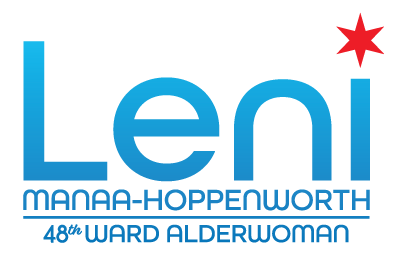Introducing: Green Social Housing
A MESSAGE FROM ALD. MANAA-HOPPENWORTH
Dear Neighbors,
Chicago is facing a housing crisis, with supply for housing unable to meet demand. There are over 119,000 fewer affordable apartments than there are families in need, and over 51% of Chicago renters are cost-burdened, meaning they spend more than 30% of their income on rent and utilities. Our federal government is slashing HUD and other lifesaving federal programs and agencies, adding to the long-standing issue.
On February 19, I stood with my colleagues in City Hall to introduce an innovative new housing program, Green Social Housing. Green Social Housing is the City’s opportunity to transform housing development and to address the housing crisis without relying on increasingly at-risk federal resources.
Green Social Housing (GSH) is an environmentally and fiscally sustainable housing model that will:
Increase City-support affordable and mixed-income housing production by up to 50%
Use green building standards to improve indoor air quality and reduce tenants’ utility bills by an average of $572/year
Significantly reduce development costs
Provide permanent affordability (the affordability requirement doesn’t expire)
Reinvest in gains; equity over time can be invested into additional projects and deeper levels of affordability
At the end of 2025, four parcels of CTA land in the 48th ward will become available for development, and we're looking at one of these parcels for a potential Green Social Housing site. Read on to learn more about what Green Social Housing is and how it works.
Yours in community,
Leni Manaa-Hoppenworth
48th Ward Alderwoman
GREEN SOCIAL HOUSING OVERVIEW
If you cannot read the images above, read a text overview of the same content below.
GREEN SOCIAL HOUSING OVERVIEW (TEXT)
What is Green Social Housing?
GSH is an innovative and proven financing model for mixed-incoming housing development
Why do we need GSH?
Chicago is facing a housing crisis (supply of housing unable to meet demand).
Chicago has 119,000 fewer affordable housing units than families in need.
Over 51% of Chicagoans are rent burdened (30% or more of their income is spent on rent and utilities).
Buildings account for 70% of Chicago’s emissions.
Poor indoor air quality leads to increased rates of childhood asthma.
What are the benefits of GSH?
Minimum 30% affordable units
Green building standards
Tenant governance
Premanently affordable
Increased housing production
Financially-independent revolving loan fund
Reinvests equity
What does mixed-income mean?
Affordable units for low-middle income Chicagoans mixed with market rate units for positive cash flow
Permanent affordability without ongoing federal subsidy
What are green building standards?
Proposed: adhere to 2022 Chicago Energy Transformation Code and DPD Sustainable Development Policy
Why are green building standards important?
Improve air quality for tenants
Reduce tenants’ utility bills by an average of $572 per year
Buildings are one of the main producers of carbon emissions in Chicago; green housing is an important step toward achieving emission reduction goals set out in the Climate Action Plan.
We will continue to share updates on this exciting initative as they are available. Please email any questions to info@the48thward.org






